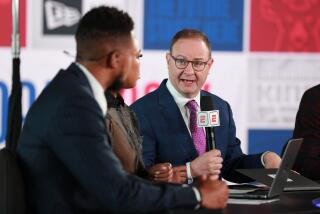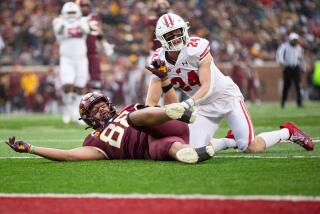Gone, Wisconsin? : Badgers Might Be Singing a Different Tune if Coach Stayed and Star Players Left for NBA
- Share via
MADISON, Wis. — Rumors of impending departures hit the Wisconsin campus last spring and immediately began multiplying.
Coach Stu Jackson, the former New York Knick coach who had brightened the school’s dismal modern basketball history by taking the Badgers to the NCAA tournament for the first time since 1947, was leaving, people felt sure. For Iowa State, for the San Antonio Spurs, for the Portland Trail Blazers . . .
Michael Finley, the sleek forward seldom seen on national TV but already pegged as a first-round draft pick by NBA scouts, would surely give up his senior year to play for pay.
Rashard Griffith, the 6-foot-11 freshman with an NBA body and an overdose of the adulation that surrounds Chicago high school hoop stars, was unhappy and turning pro at 19. Or transferring. All because he didn’t think he had been given the ball enough as a freshman.
Even Wisconsin’s own sports publication, Badger Plus, wondered if the fight song “On Wisconsin” should be replaced by the Clash’s “Should I Stay or Should I Go?”
Funny thing, Finley didn’t go anywhere, letting the exodus of Big Ten undergraduates--Glenn Robinson, Juwan Howard, Jalen Rose--proceed without him.
Griffith came back too, after getting some comforting and a dose of reality. He probably will be a fine pro one day, but he isn’t ready yet. With those two back, the Badgers are ranked 15th and have a shot at the Big Ten title.
Jackson?
“I’ve just turned down a position that would offer me twice--twice!--as much money as I’m presently making,” he told a reporter after Iowa State had courted him last spring. “To say I’m leaving any time soon is a misnomer.”
Actually, it was soon to be a fact. After counseling Finley and Griffith to stay in school, Jackson took a job as general manager and vice president of Vancouver’s NBA expansion franchise in July.
It was a move that met with howling charges of disloyalty by fans who had been waiting for Jackson to jilt them almost from the day he arrived. “How could you do this to us?” demanded one outraged fan in a phone call to Jackson. Many of the players understood, though.
“I would have been mad if he was leaving to go coach another college,” said Griffith, who patched up his relationship with Jackson while playing for him in the U.S. Olympic Festival last summer. “I wasn’t mad he was going to be general manager and vice president in Vancouver. That’s a career move. I couldn’t be mad at him for bettering his position in life.
“You know, one day I’m going to leave for the NBA. It might be next year, it might be the year after, it might be my senior year. I’m going to leave. That’s a career goal for me. That’s me making myself better financially, improving my life. I look at it from that perspective.”
Said Jackson: “Griffith and Mike understood why I was leaving. They were mature in the way they handled it, and the players handled it a lot better than some other people did.”
In the end, Jackson was the one Wisconsin basketball could most afford to lose. Sure, in two years he took a program with only three winning seasons since 1950--though the Badgers won the NCAA title in 1941--and put it on the right track. Who else but Jackson, with his NBA aura, could have led recruits into decrepit Wisconsin Fieldhouse, an old barn decorated with NCAA boxing banners from the 1940s and 50s, gaze up toward bleacher seats with gaps large enough for a child to slip through, and say, reverently, “Reminds you of Chicago Stadium, doesn’t it?”
Jackson insisted that the basketball offices be renovated to look big-time, and he landed Griffith, one of the top couple of big men in his recruiting class.
Still, if Finley--who by staying has risen to a potential lottery pick next June--or Griffith had left, the team probably would have fallen back into its accustomed spot in the lower reaches of the Big Ten.
Without Jackson, the team simply turned to Stan Van Gundy, a bright, little-known 35-year-old assistant with coaching in his blood. His brother, Jeff, is a Knick assistant, and his father, Bill, is a junior college coach in New York State.
The timing and turmoil helped Van Gundy land a plum job that might otherwise have gone to a more veteran coach.
“Nobody deserves a job like this,” Van Gundy said. “If you say that, it’s a very arrogant thing to say, because I know there’s a couple hundred guys out there, some of them high school coaches, some of them small-college coaches and whatever have you, as qualified as I am. And that’s not trying to be humble, because I think at the same time, as you’re coming up in the profession, you’re looking at the people above you and saying, ‘Geez, I could do as good a job as that guy.’ And it’s true, it goes both ways.”
Behind him, Jackson left a torched reputation, thanks to his decision to leave and the Griffith saga.
Griffith--who averaged 13.9 points and 8.5 rebounds as a freshman and had 22 points and 15 rebounds in a first-round NCAA tournament victory over Cincinnati--blindsided Jackson and his teammates when he told a Chicago reporter while he was home for spring break that he was leaving Wisconsin.
“It was a big surprise, for the mere fact that I didn’t know he was as unhappy as he was saying he was,” Finley said. “It kind of hurt me. It seemed to come out of nowhere.”
Jackson went into crisis mode, but it wasn’t until nearly two months later that Griffith announced that he would stay.
“People got the impression Stu was catering to Rashard and the whole thing, so he took a beating,” Van Gundy said.
“I have a lot of respect for what he did. Rather than get caught up in the public-relations image part, he did what was right. If (Griffith) didn’t come back, Stu would have looked great for a couple of weeks in the paper with his principles and his image and the writers would have loved it. But the bottom line is, it wouldn’t have been better for our program or for Rashard, and I think Stu understood that and did what was right instead of what was good for his image. I think it worked out best for everybody except Stu.”
Griffith’s reputation suffered too, and some people expect him to be booed on his home court this season.
“A lot of people are going to look down on Rashard because of what went on in the spring,” Finley said. “People don’t want to give him a chance, but I say, knowing Rashard off the court, give him a chance. Don’t just jump down his throat.”
Griffith’s frustration apparently grew once he was back around the entourage of advisers, brokers, would-be agents and hangers-on who surround a player who can brag he had “my choice of five high schools” as an eighth grader before choosing Chicago’s Martin Luther King. The implication Griffith resents most is that all his decisions are made by his mother, Elaine, who reportedly clashed with Jackson.
“I’d say we had a misunderstanding, a miscommunication,” Griffith says of his relationship with Jackson. “I told him a couple of times I wasn’t getting the ball and he addressed it, but it would go right back to that. That was kind of frustrating for me. The kind of player I am, I want to see the ball. I might not shoot every time. I’m not selfish, that’s not me. I’m not going to force it up, that’s not how the game is played, that’s not how championships are won.
“My thinking was, I feel I can score, I can rebound, I can block shots, I can play defense, I can do all that. Just don’t have me out there, limiting me, just playing and defensive rebounding. I can score 20 points, I can grab 13, 14, 15 rebounds, I can block five or six shots a night. Just let me play. Just don’t stop me from playing my game.”
Van Gundy and Finley, and even Jackson, defend Griffith, saying he’s a likable person, even an unselfish player, who got some bad advice.
“It’s very simple,” Jackson said. “He’s a 19-year-old man that is influenced, like most 19-year-olds, by outside influences. When faced by that, he almost made some decisions regarding his future that might not have been very mature.”
Finley, eager to take Wisconsin beyond the second round of the NCAA tournament before he leaves for the NBA, knows what one of the keys will be.
“Yeah,” he said, “we’ve got to keep the big boy happy this year.”
More to Read
Go beyond the scoreboard
Get the latest on L.A.'s teams in the daily Sports Report newsletter.
You may occasionally receive promotional content from the Los Angeles Times.










